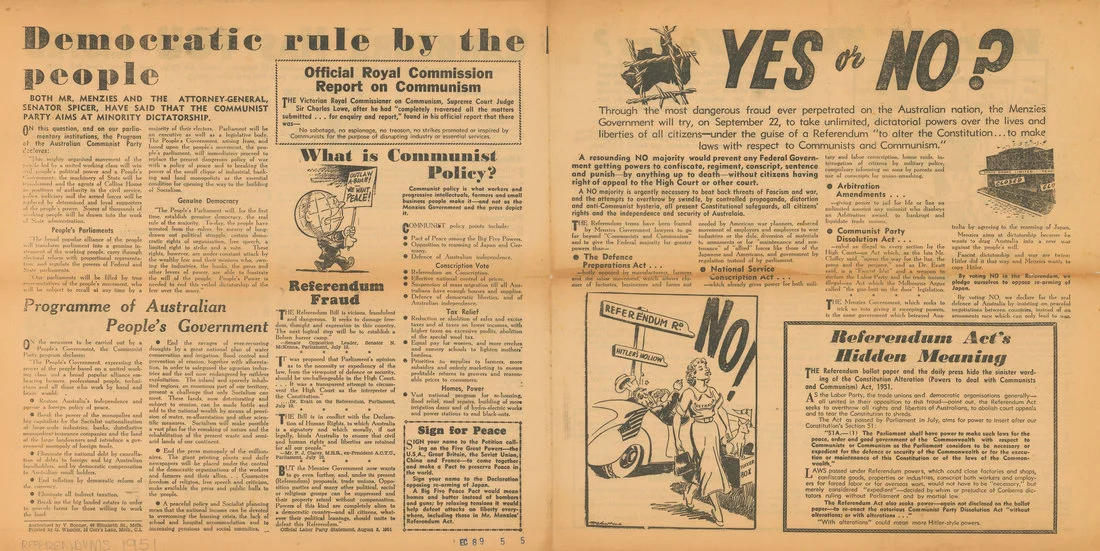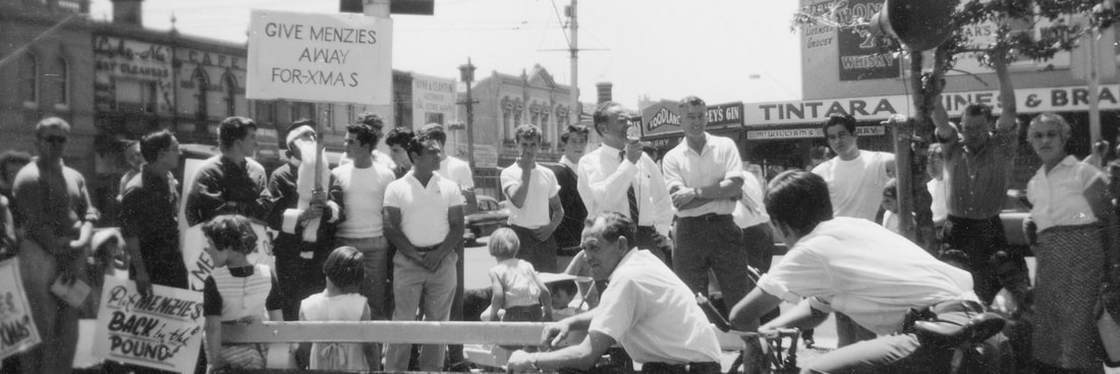The Government overreached when it banned the Communist Party
Australian Communist Party v The Commonwealth of Australia (1951)
Facts of the case
In 1950 Liberal Prime Minister Menzies introduced the Communist Party Dissolution Act. At this time many Australians were frightened of communism.
The law declared the Australian Communist Party to be unlawful. The Act dissolved the party and confiscated its property without compensation.
The law also empowered the Government to declare persons and organisations as communists. Declared persons could not work for the Government or in specified industries. If a person was declared to be a communist, and they wished to challenge the declaration, they had to prove that they were not a communist. This meant that the burden of proof was turned around.
The law contained a long preamble which declared that the Communist Party was engaged in subversion and involved in activities to overthrow the system of government in Australia.
The Australian Communist Party and several unions challenged the law in the High Court.
A speaker at a Communist Party of Australia street meeting in Sydney in the early 1940s. Source: © Search Foundation, University of Melbourne Archives
Speaker at an unknown event. Large banners. Source: © Search Foundation, University of Melbourne Archives
Issues considered by the court
The Court had to consider whether the Commonwealth had power to pass the law under the ‘defence’ power in the Constitution. It also had to consider whether Parliament’s statement in the Preamble of the Act about the dangers of communism meant that it was a law about subversion.
Decision
The Court accepted that the Commonwealth had legislative power to protect itself from subversion, whether under the defence power (section 51(vi)), laws incidental to the executive power (sections 51(xxxix) and 61), or an implied legislative power.
However, the Parliament could not base legislation upon its own declaration that a fact exists. This fact must be determined to exist by a court. As one Judge said, just because Parliament says something is a lighthouse does not make it a lighthouse. It is up to the Court to decide this.
Parliament had, in essence, simply declared the Communist Party to be guilty of subversion in the Act’s preamble. This was unconstitutional.
Background to the case
The Communist Party of Australia was founded in Sydney in 1920 by a group of Australian socialists who were inspired by the Russian Revolution. After the win in the High Court, the Communist Party of Australia was emboldened. The party was eventually deregistered in 1991 but was later replaced by another party using the same name.
Bert Evatt, Labor Deputy Opposition Leader, who had been formerly a High Court Justice, appeared in the Communist Party Case on behalf of one of the unions. He chose to do so because he believed the legislation amounted to an attack on fundamental liberties including freedom of association and expression.
Later in 1951 the Government held a referendum in an attempt to ban communists. The question was:
“Do you approve of the proposed law for the alteration of the Constitution entitled ‘Constitution Alteration (Powers to deal with Communists and Communism) 1951’?”
The referendum failed. Only three States approved change and the total No vote was 50.56%.
Bert Evatt. Source: High Court of Australia
Chief Justice Latham’s bench. Source: High Court of Australia
Did you know?
- If any parliament in Australia passes a law that is contrary to the Constitution, the High Court can, in a case brought before it, exercise its power of judicial review and declare the law invalid. This means the law will have never had effect.
- This is a check by the Court on the exercise of arbitrary legislative power and a means of upholding the rule of law.
- This provides protection against the infringement by governments of constitutional rights.





